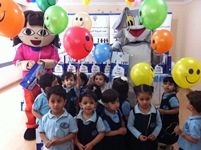 Children take part in World Immunization Day activities. Photo by Dr Ghaliya Al Motery from the Ministry of Health of Kuwait In the last week of April 2015, the Region witnessed remarkable commitment and the strong leadership of Member States in observing World Immunization Week. Since commencement of Immunization Week events worldwide on 24 April, the WHO Eastern Mediterranean Region, comprising 22 countries stretching from Pakistan to Morocco, has been engaged in various advocacy, communication and education activities to educate the public on the importance and benefits of vaccines and immunization.
Children take part in World Immunization Day activities. Photo by Dr Ghaliya Al Motery from the Ministry of Health of Kuwait In the last week of April 2015, the Region witnessed remarkable commitment and the strong leadership of Member States in observing World Immunization Week. Since commencement of Immunization Week events worldwide on 24 April, the WHO Eastern Mediterranean Region, comprising 22 countries stretching from Pakistan to Morocco, has been engaged in various advocacy, communication and education activities to educate the public on the importance and benefits of vaccines and immunization.
Preparations
Prior to the event, 19 countries were engaged in comprehensive planning activities. In each country, planning committees were established and led by national immunization programmes. Committees included technical staff from WHO and UNICEF country offices, other relevant government entities and national immunization stakeholders, such as national immunization technical advisory groups (NITAGs). NITAGs contributed to planning in at least 11 countries. Planned activities are mainly funded by ministries of health. Even in low-income countries, ministries of health allocated a budget for the plans, with partners contributing to funding gaps. Effective planning for World Immunization Week in 2015 exemplified great country leadership, commitment and effective partnerships among all stakeholders involved in immunization activities.
Campaign activities
According to planning reports and initial news, 14 Member States had organized launching ceremonies under the patronage of high-level decision-makers. Launching ceremonies targeted the media. Many countries had developed successful media engagement strategies targeting national newspapers and television.
In at least 15 countries, advocacy materials were prepared, printed and distributed to the public widely during social mobilization events, seminars and training. 11 countries made preparations for customized training of health care workers. At least 11 countries are expanding their vaccination services during the week such as tracking unvaccinated people and defaulters and extending operational hours of vaccination facilities.
Afghanistan and Syria are conducting large-scale measles campaigns and polio campaigns are under way in Egypt, Iraq and Jordan.
In addition, some countries announced introduction of new vaccines and improvements to their national immunization programmes; such as hepatitis B birth dose in Bahrain, injectable polio vaccine in Islamic Republic of Iran and Morocco, rotavirus in occupied Palestinian territory and measles-mumps-rubella vaccine in Lebanon.
Tragedy in Somalia and main challenges
The tragic loss of four colleagues from UNICEF, killed during a recent attack in Somalia, weighed heavily on the minds of all. Ms Brenda Kyenune, one of the humanitarian workers killed, had been actively engaged in planning of World Immunization Week activities in Puntland and managing social mobilization and communication initiatives in support of polio eradication in Somalia since 2014. Colleagues in Somalia observed the Week in deep grief.
Despite prevailing security challenges Afghanistan, Iraq, Libya, Pakistan, occupied Palestinian territory, Somalia and Syria planned activities were conducted successfully. In 2015, only Yemen was unable to observe the Week extensively due to the deteriorating security situation which compromised activities.
Security concerns, refugees, hard-to-reach populations, funding limitations and lack of public awareness for vaccines have been the challenges most cited in county planning reports. The issue of vaccine hesitancy and the perception of the public to vaccines were extensively discussed during the last regional meeting of the Expanded Programme on Immunization managers, organized by WHO Regional Office for the Eastern Mediterranean, in November 2014. During that event, World Immunization Week was cited as the important opportunity to raise public awareness of the benefits of immunization.
Campaign success
The strong support of decision-makers, solid country ownership of national immunization programmes and the dedication of national immunization programme staff and frontline caregivers have been the main drivers contributing to the unprecedented success of this year’s World Immunization Week.






